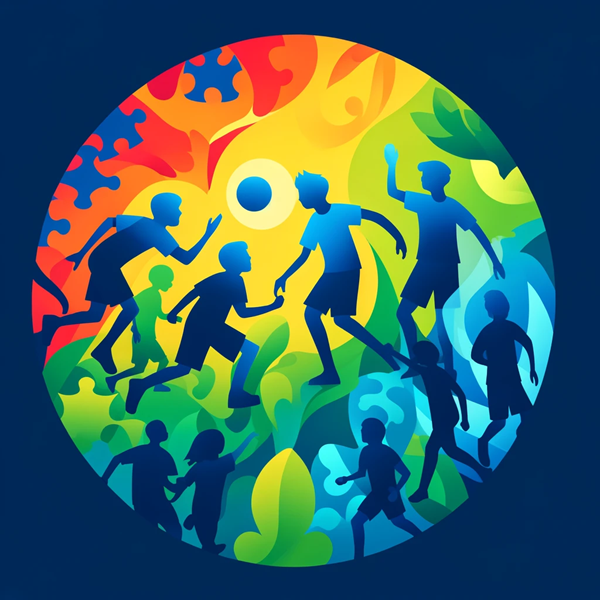Building Inclusive Sports Teams: Essential Tips for Embracing Diversity
Learn how to create an inclusive sports team environment that respects and celebrates differences, fostering teamwork and improving performance.
Effective strategies for developing inclusive sports teams embrace diversity and foster a positive, respectful environments for every athlete.
– Coach Johnny

Support the JK Tribe with a Johnny’s Kidz, The Game Belongs to Them T-Shirt

Support the JK Tribe with a Johnny’s Kidz, The Game Belongs to Them Hoodie
Introduction: The Importance of Inclusion in Sports
In the world of sports, inclusion goes beyond simply ensuring that everyone gets a chance to participate.
Establishing a team culture that values and celebrates each athlete’s distinct contributions is essential for creating a cohesive and successful sports team.
By recognizing and appreciating the unique skills, talents, and perspectives that each individual brings to the table, teams can leverage these differences to their advantage.
When athletes feel valued for their specific strengths and contributions, they are more likely to be motivated, engaged, and committed to the team’s goals.
This sense of value fosters mutual respect among team members and creates a supportive environment where everyone feels empowered to perform at their best.
This blog will delve into effective strategies coaches and team leaders can implement to create an inclusive environment that supports and flourishes by embracing diversity.

“When we create a sports environment that welcomes everyone, we increase activity rates and build community and social cohesion.”
– Tom Farrey, Executive Director of The Aspen Institute’s Sports & Society Program
Tips for Fostering an Inclusive Environment
1. Educate Yourself and Your Team
Knowledge is the foundation of empathy. Provide training sessions for your team that cover topics relevant to diversity and inclusion. Understanding different cultures, abilities, and perspectives can help team members appreciate each other’s differences and foster a more harmonious environment.
2. Establish Clear Anti-Discrimination Policies
Make it clear that discrimination of any kind will not be tolerated. Develop a straightforward policy that outlines expected behaviors and the consequences of violating these expectations. This policy should be communicated clearly to all team members and consistently enforced.
3. Promote Open Communication
Encourage athletes to express their thoughts and concerns regarding team dynamics without fear of retribution. Regularly scheduled team meetings can be a great venue for these discussions, providing a safe space for voices to be heard.
4. Recognize and Celebrate Differences
Take the time to celebrate cultural, physical, and personal differences within your team. This could be through acknowledging various cultural holidays, hosting diversity days, or simply allowing team members to share stories about their backgrounds and experiences.
5. Adapt Practices and Games to Include Everyone
Modify games and practices to accommodate athletes of all abilities. This might mean adjusting equipment, changing rules, or varying coaching techniques to ensure everyone can participate meaningfully.
6. Create Opportunities for Peer Interaction
Design team-building activities that encourage interaction across different groups within the team. Activities that require cooperation and promote a shared goal can help break down barriers and build trust among teammates.
7. Lead by Example
As a coach or team leader, your actions set the tone for the team’s culture. Show respect and appreciation for diversity in your speech, actions, and decisions. Your commitment to inclusion will inspire your athletes to follow suit.
8. Deepen Understanding of Diverse Needs
Coaches and administrators should continually educate themselves on subjects such as neurodiversity, including children on the spectrum. Learn to identify potential signs of different needs and explore ways to leverage these athletes’ unique talents. Training programs, workshops, and seminars on these topics can equip you with the knowledge to support these athletes better and harness their strengths within the team context.
“Inclusion teaches everyone love and acceptance. Unified Sports has shown that playing together is a quick path to friendship and understanding.”
– Tim Shriver, Chairman of Special Olympics

Conclusion: The Power of an Inclusive Team
Adopting inclusion strategies isn’t just about ensuring every player gets a turn; it’s about creating a dynamic team culture that actively honors and embraces diversity.
This commitment to diversity enriches team interactions by bringing varied perspectives and strengths to the forefront, fostering a deeper understanding and respect among teammates.
Such an environment improves problem-solving and decision-making and boosts creativity and innovation within the team.
Moreover, this culture of inclusion and respect can lead to significant achievements within the competitive arena.
Teams that feel supported and valued are more cohesive, motivated, and ultimately more effective in meeting their goals.
The benefits of such an inclusive approach extend beyond the playing field, teaching athletes valuable life lessons about respect, empathy, and collaboration that can be applied to countless other aspects of life.
Fostering an inclusive team is a holistic strategy that enhances sporting performance while contributing to all team members’ personal growth and development.
It creates a legacy of respect and unity, setting a standard for how sports should be played and how athletes interact with one another and their broader communities.
FAQ
References
- Special Olympics – Unified Sports:
- Special Olympics Unified Sports promotes social inclusion through shared sports training and competition experiences. This program is an excellent example of how inclusion can be practically implemented in sports.
- Link: Special Olympics Unified Sports
- The Aspen Institute – Project Play:
- The Aspen Institute’s Project Play initiative provides tools and resources that help build inclusive sports programs that retain young athletes’ interest and commitment. They offer a range of resources that discuss the importance of inclusion in youth sports.
- Link: Project Play by The Aspen Institute
- The National Center on Health, Physical Activity and Disability (NCHPAD):
- NCHPAD is a resource center that helps people with disabilities participate in physical activity and sports. It offers guidelines and tips for creating inclusive environments in these areas.
- Link: NCHPAD
- Child Mind Institute – Supporting Kids with Learning Disabilities in Sports:
- This article offers insights into how coaches and sports programs can support children with learning disabilities, a key aspect of fostering inclusivity.
- Link: Child Mind Institute
- Autism Speaks – Autism and Sports:
- Autism Speaks provides information on how sports participation can benefit individuals with autism and offers tips on creating a supportive environment that accommodates their needs.
- Link: Autism and Sports
Join the JK Tribe
Coach Johnny is a youth sports coach with over 30 years of experience. He continues to coach various sports in various age groups (pre-high school) for all genders. He is also the founder of Johnny’s Kidz and the JK Tribe. If you would like to support his journey and become a Tribe member, reach out and Buy Coach A Cup of Coffee. And remember, The Game Belongs to Them!